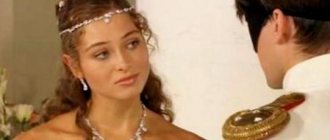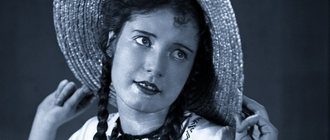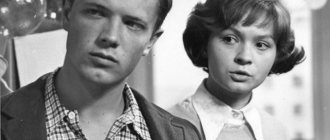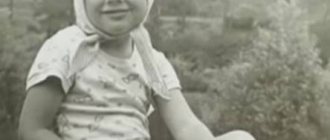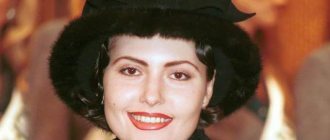Marina Ivanovna Tsvetaeva (life: 1892-1941) - famous Russian poetess. She was the daughter of Ivan Vladimirovich Tsvetaev (1847-1913), a scientist. Her work is characterized by romantic maximalism, rejection of everyday life, the doom of love, and motives of loneliness. The main collections of the poetess are “Milestones” (1921), “Craft” published in 1923, “After Russia” (1928). She also created a satirical poem called “The Pied Piper” in 1925, and “The Poem of the End” the following year. The biography of Marina Ivanovna Tsvetaeva will be discussed in this article.
Tsvetaeva family
Marina Tsvetaeva was born on September 26 (Old Style - October 8), 1892 in Moscow. Her father, as we have already mentioned, was a scientist who specialized in ancient history, art and epigraphy. He was the creator and also the first director (from 1911 to 1913) of the Museum of Fine Arts. The professor's first marriage was very successful, but after the birth of two children, the young wife died, and Ivan Tsvetaev remarried Maria Main. In 1892, on September 26, this couple had a girl who received the name Marina (that is, “sea”). This is how the biography of Marina Ivanovna Tsvetaeva begins.
Mother, Main Maria Alexandrovna, died in 1906. She was a pianist, a student of A. G. Rubinstein. This woman had a huge influence on Marina. She dreamed that her daughter would also become a pianist. However, the world of poetry attracted young Tsvetaeva more than the performance of scales. At the age of six, the girl wrote her first poems. Moreover, Marina worked not only in Russian, but also in French and German. The mother raised her daughters (Marina and her sister Anastasia) quite strictly. They received an excellent education. The grandfather of the half-brother and sister is the historian and publicist Dmitry Ivanovich Ilovaisky.
Origin and formation
Ivan Tsvetaev founded the Museum of Fine Arts, studied philology, and worked at Moscow University. The poetess’s mother studied music, was fond of playing the piano, also taught her daughter this, and wrote poetry. It was from her that Marina inherited her passion for poetry. Maria Alexandrovna was very proud of her, but still paid most of her attention to her youngest daughter Anastasia. This offended the poetess a little. Tsvetaeva’s parents raised four children: three girls and one boy.
At the age of 9, the little writer entered the fourth gymnasium for girls, where she studied for only a short time. When the girl turns 10, her mother is diagnosed with tuberculosis. In this regard, the family will move to the coast between the Ligurian Sea and the mountain range. Later, our heroine will change two more places of study. In the summer of 1905, Tsvetaeva’s family will come home. They will settle in a city on the shores of the Black Sea - in Yalta. Next summer they will move to Tarusa - a place with which the life and work of Marina Tsvetaeva are so closely intertwined.
Education of Marina Tsvetaeva
At the insistence of her mother, at a young age Marina Tsvetaeva went to a music school and also took music lessons at home. But these activities did not develop further after Mary’s death. Marina and her sister received their primary education at home, under the guidance of their mother. At the age of 8-9 years, the future poetess attended classes at the M. T. Bryukhonenko gymnasium, and then in Switzerland, in Lausanne. She studied in a Catholic boarding school in 1903, and then went to a French boarding school after the family moved again. Tsvetaeva continued her studies in Germany, at a boarding school in Freiburg. Languages were easy for her, and subsequently she often made money from translations, since creativity did not bring much income to a poetess like Marina Tsvetaeva. Her biography and poems began to arouse interest among many only after her death.
Marina went to Paris in 1908, where she entered the Sorbonne. Here she attended a course of lectures on Old French literature.
Getting an education
From 1899 to 1902, Marina was a student at women's gymnasium No. 4 in Moscow. Before graduation, she contracted tuberculosis, causing the entire family to temporarily move to the Adriatic coast of Italy for treatment.
From 1903 to 1904, Tsvetaeva was a student at a boarding school in France, and after graduation she went to the city of Freiburg, where she continued her studies. In 1906, Tsvetaeva entered the prestigious women's gymnasium named after. V.P. von Derviz, from which she was subsequently expelled for dissent and inappropriate behavior. It was not possible to graduate from the gymnasium. A.S. Alferova. And only in 1910 Tsvetaeva graduated from the women's gymnasium. M.T. Bryukhonenko.
Beginning of literary activity
The creative biography of Marina Ivanovna Tsvetaeva begins as follows. The first literary experiments were associated with the circle of symbolists from Moscow. Marina Ivanovna met Bryusov, who had a great influence on her early poetry, as well as such a poet as Elios (Kobylinsky Lev Lvovich). She participated in the activities of studios and circles located at the Musaget publishing house. Also greatly influenced by the artistic and poetic world at home (in Crimea) of the art critic and poet Maximilian Voloshin. She visited Koktebel many times.
First collections
In his two poetry collections “Evening Album” (1910) and “Magic Lantern” (1912), as well as in the poem “The Sorcerer” written in 1914, he carefully described household items (portraits, mirrors, living room, nursery), reading, walks on the boulevard, music lessons, relationships with her sister and mother, the diary of a young schoolgirl was imitated. “Evening Album” was dedicated to the memory of Maria Konstantinovna Bashkirtseva, an artist, which emphasizes the diary, confessional orientation. In the poem “On a Red Horse,” written in 1921, the story of the poet’s development took the form of a fabulous romantic ballad.
History of success
At the age of 6-7 years, the future poetess began her unique creative path, writing her first poems. At the age of 18, she published her debut collection of poems entitled “Evening Album” (1910). She had no sponsors; Marina Ivanovna published the collection on her own. The response to her work was immediate. She immediately attracted the attention of famous people. Gumilev Lev Nikolaevich, Valery Yakovlevich Bryusov and Voloshin were interested in the young writer. Acquaintance with them opens up to her a new literary world of the Symbolists, which consists of many circles where Tsvetaeva never found herself. Her style was so original and free from extraneous influences that it failed to fit into any aesthetic concept.
The poetic world of Marina Tsvetaeva is based on her life principles, which she herself carefully preserved for posterity in her notes:
The only reference: your own hearing and, if you really need it, Savodnik’s theory of literature: drama, tragedy, poem, satire.
The only teacher: your own work.
And the only judge: the future.
Further creativity
Dedicated to the relationship with Sophia Parnok (whom we will talk about later), the cycle of poems “Girlfriend” appeared in 1916. During the Civil War, a cycle called “Swan Song” was published, which was dedicated to the feat of white officers. Her work includes poems and romantic plays, for example “On a Red Horse”, “Egorushka”, “The Tsar Maiden”.
The affair with Rodzevich inspired the creation of the collections “Poem of the End” and “Poem of the Mountain.” Marina's last lifetime collection was published in Paris. The family moved here from the Czech Republic in 1928. However, most of her poems remained unpublished. Marina made her living mainly through translations and creative evenings.
Poems
Marina Tsvetaeva's first collection, entitled “Evening Album,” was published in 1910. It mainly included her creations written during her school years. Quite quickly, the work of the young poetess attracted the attention of famous writers, Maximilian Voloshin, Anna Akhmatova’s husband, Nikolai Gumilyov, and the founder of Russian symbolism Valery Bryusov were especially interested in her. On the wave of success, Marina writes her first prose article, “Magic in Bryusov’s Poems.” By the way, a rather remarkable fact is that she published her first books with her own money.
First edition of the “Evening Album” | Feodosia Museum of Marina and Anastasia Tsvetaev
Soon, “The Magic Lantern” by Marina Tsvetaeva, her second collection of poetry, was published, and then her next work, “From Two Books,” was published. Shortly before the revolution, the biography of Marina Tsvetaeva was connected with the city of Alexandrov, where she came to visit her sister Anastasia and her husband. From the point of view of creativity, this period is important because it is full of dedications to loved ones and favorite places and was later called by specialists “Tsvetaeva’s Alexander Summer.” It was then that the woman created the famous cycles of poems “To Akhmatova” and “Poems about Moscow.”
Akhmatova and Tsvetaeva in the images of Egyptian women. Monument "Silver Age", Odessa | Panoramio
During the Civil War, Marina became sympathetic to the white movement, although, as mentioned above, she generally did not approve of dividing the country into conventional colors. During that period, she wrote poems for the collection “Swan Camp”, as well as large poems “The Tsar Maiden”, “Egorushka”, “On a Red Horse” and romantic plays. After moving abroad, the poetess composed two large-scale works - “Poem of the Mountain” and “Poem of the End”, which will be among her main works. But most of the poems from the emigration period were not published. The last collection to be published was “After Russia,” which included the works of Marina Tsvetaeva until 1925. Although she never stopped writing.
Manuscript by Marina Tsvetaeva | Unofficial site
Foreigners appreciated Tsvetaeva's prose much more - her memories of Russian poets Andrei Bely, Maximilian Voloshin, Mikhail Kuzmin, the books “My Pushkin”, “Mother and Music”, “House at Old Pimen” and others. But they didn’t buy poetry, although Marina wrote a wonderful cycle “To Mayakovsky,” for which the “black muse” was the suicide of the Soviet poet. The death of Vladimir Vladimirovich literally shocked the woman, which can be felt many years later when reading these poems by Marina Tsvetaeva.
Tragedy
The biggest mystery of the family of Efron (the poetess’s husband) and Tsvetaeva: what prompted them to move to the USSR in 1939? A former white officer, Efron, who fought stubbornly against the Bolsheviks, suddenly believed in the triumph of communism. While still in Paris, he contacted a society controlled by the NKVD, which was engaged in the return of emigrants to their homeland. In 1937, the first to return to Moscow was Marina Tsvetaeva’s daughter, Ariadna (who was arrested before anyone else). After this, Sergei Efron fled, as he was compromised by connections in Paris with the NKVD. Marina and her son followed her husband, fulfilling the duty of a loving wife to the end.
Biography
The future celebrity was born in 1892 in Moscow. Her birthday fell on the feast of St. John the Evangelist. Subsequently, the poetess will mention this fact more than once in her creative works.
Marina Tsvetaeva in childhood
The girl's family was intelligent and had a direct influence on art. His father was a famous philologist and professor; he was married for the second time to Marina’s mother, who was a talented pianist. The parents tried to give their daughter the best education and pass on their accumulated experience to her. So, her mother taught her to play the piano, and her father instilled a great love for literature.
Young Marina with her father
As a child, Tsvetaeva often traveled abroad, so she easily spoke German and French. She also received education abroad; the girl visited boarding schools in Germany and Switzerland, and at the age of 16 she attended lectures at the French Sorbonne, but due to certain circumstances she did not complete her studies there.
The surviving photographs of Marina Tsvetaeva provide an opportunity to get an idea of some periods and moments of her life, including childhood and adolescence.
The future poetess with her sister Anastasia
The last years of Marina Ivanovna’s life
The following events complete her biography. Marina Ivanovna Tsvetaeva survived the arrest of her husband and daughter in 1939, this crippled the poetess. She was left alone with her son George. Moreover, the relationship with him, spoiled by overly enthusiastic attention, was ambiguous. Marina Ivanovna Tsvetaeva was very worried about all this in recent years. A brief biography based on the dates of the last years of her life ends with the following fateful event. On August 31, 1941, after being evacuated to Yelabuga due to the outbreak of World War II, Tsvetaeva hanged herself on the Kama River, in the entryway of the house that had been allocated for her and her son. The grave of Marina Tsvetaeva was never found, despite the efforts made by her sister Anastasia, who was rehabilitated in 1959, as well as her daughter Ariadna (rehabilitated in 1955). In August 1941, Sergei Efron was shot in Moscow.
This is a short biography of Marina Ivanovna Tsvetaeva.
Suicide of Tsvetaeva
On August 31, 1941, Marina Tsvetaeva was found hanged in her house. It remains interesting that she hanged herself with a rope that Boris Pasternak gave her so that she could bandage her suitcase. Who would have thought what a fatal mistake he made then. However, one can only guess the real motives for suicide. One thing was clear - the Tsvetaeva who existed before the start of the civil war could no longer exist. Without experiencing the humiliation associated with a new job, without experiencing emigration, exclusion from home, husband and daughter, she decided to take such a terrible step. Three suicide notes were found with her: to the evacuees, to Aseev and to his son. In a note to Murlyga (as she called her son), she wrote about how boundlessly she loved dad and Alya.
The great poetess was buried on September 2, 1941, in the city of Elabuga. The location of her grave at the Peter and Paul Cemetery is not known for certain. In 1960, the poetess’s sister Anastasia decided to erect a cross in memory of Marina in the southern part of the cemetery. A sign was placed on the cross, where it was written that Marina Tsvetaeva was buried in this place. And only in 1970, admirers of her talent erected a monumental monument.
Today, the place where the monument is located is considered to be the grave of the great poet Marina Ivanovna Tsvetaeva.
In memory of Marina Tsvetaeva, Anna Akhmatova wrote a touching poem “Late Response”. Also, in memory of her, in 1996, the group “White Guard” released a music album under the symbolic name “Marina”. Monuments were erected in Moscow, Odessa and the French city of Saint-Gilles-Croix-de-Vie, where the poetess lived and worked for some time. Streets were named in honor of Tsvetaeva, museums were opened in her memory, and documentaries and feature films were made.
The meaning of the poetess’s creativity
The poetess we are interested in, unfortunately, did not receive recognition during her lifetime. She had to go hungry, and her creative evenings and collections were not appreciated by her contemporaries. At present, however, Tsvetaeva is rightfully considered one of the most prominent representatives of Russian poetry of the Silver Age. A short biography of Marina Ivanovna Tsvetaeva, as well as her poems, are included in the compulsory school curriculum. Her poems are very popular today, many of which have become famous romances set to music. Now Marina Tsvetaeva enjoys love and recognition not only in Russia, but also abroad. A short biography in English of Marina Ivanovna, for example, has been created by many authors. In the Netherlands, in Leiden, there is a house on the wall of which Tsvetaeva’s poems are written (photo below).
Personal life
It should be noted that personal life occupied a significant place in the biography of Marina Tsvetaeva. She met her future husband in 1911. This event took place in the house of Maximilian Voloshin, with whom Marina had a close friendship.
The poetess's chosen one turned out to be Sergei Efron; within six months they formalized their relationship, and he became her husband.
Marina Tsvetaeva and Sergei Efron
However, Tsvetaeva was a very romantic person, so at different periods of her life other men periodically won her attention.
These include the following:
- Boris Pasternak, with whom I had a relationship for about 10 years. Moreover, the connection lasted not only in Russia, but also abroad, during the period of emigration;
- Konstantin Rodzevich is a sculptor and lawyer, whom we met in Prague. The relationship lasted six months, after which Marina decided to break it off, while she symbolically volunteered to help Konstantin’s bride in choosing a wedding dress.
Tsvetaeva and Pasternak
Children occupied a significant place in the personal life and biography of Marina Tsvetaeva. The first daughter, Ariadne, was born quite soon after the marriage. The second daughter Irina was born in 1917. However, her appearance occurred during the revolution, as a result of which Marina’s husband fled abroad.
Ariadna and Irina
She had to be left alone with the children; for some time they were placed in an orphanage. Ariadne suffered a serious illness, but she recovered. Irina’s fate turned out to be sadder - after an illness she died.
Marina Tsvetaeva with her daughter Ariadna
Tsvetaeva also had a third child - son Georgiy, whom she gave birth to after her departure abroad, where she was reunited with her husband. He was not in good health, but as a teenager he went to the front during World War II and died in 1944. Both he and Ariadne had no children, and therefore there are no descendants of the great poetess left.
The poetess with her son Georgiy on a walk
Interesting: Anton Zlatopolsky: biography, personal life


